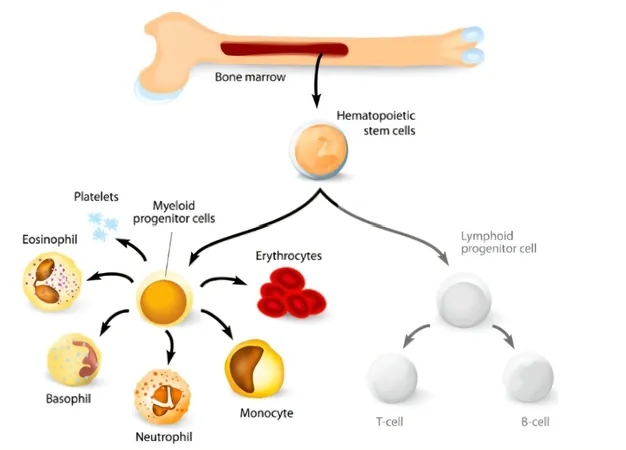
Groundbreaking Research Revolutionizes Time-to-Event Analysis in Myeloproliferative Neoplasms
2024-11-25
Author: Yu
Introduction
In an exciting development from the Karolinska Institutet, recent research has unveiled the revolutionary use of flexible parametric survival models (FPM) for analyzing complex time-to-event data, particularly in the field of myeloproliferative neoplasms (MPNs). This innovative approach has the potential to significantly enhance our understanding of chronic hematologic malignancies, where the overproduction of blood cells can lead to dire consequences such as thrombosis, bleeding disorders, and the risk of advancing to acute myeloid leukemia (AML) and myelodysplastic syndromes (MDS).
Research Overview
Conducted by doctoral student Nurgul Batyrbekova at the Department of Medical Epidemiology and Biostatistics, the thesis presents a robust methodology that does not rely on the traditional single time-scale models, which have been found to introduce biases and inaccuracies. Instead, Batyrbekova’s research demonstrates how FPM can effectively model multiple time scales simultaneously, a shift that could change the landscape of survival analysis.
Clinical Implications
The research highlights critical clinical questions relating to MPN, examining how factors such as age and duration of the disease influence rates of thrombosis and the transition to more severe forms of leukemia. This groundbreaking method opens new avenues for exploration, enabling researchers and healthcare professionals to better predict outcomes and tailor treatment strategies accordingly.
Current Practices and Limitations
Current practices in the medical field often depend on simplified models that fail to capture the complexity of disease progression in conditions like MPN. By addressing this gap, Batyrbekova's findings suggest that flexible parametric models may provide more accurate and clinically relevant insights, paving the way for improved patient management and treatment options.
Conclusion
As the medical community continues to grapple with the challenges posed by myeloproliferative neoplasms, Batyrbekova’s work stands out as a beacon of innovation, potentially leading to transformative changes in how these conditions are analyzed and treated. This research not only serves as a crucial step forward in hematology but may also set a precedent for future studies in other complex diseases.
Future Directions
Stay tuned for more developments as this research unfolds, and consider how these findings could impact ongoing patient care in the realm of myeloproliferative neoplasms. This is a story that medical professionals and patients alike will want to follow closely!




 Brasil (PT)
Brasil (PT)
 Canada (EN)
Canada (EN)
 Chile (ES)
Chile (ES)
 Česko (CS)
Česko (CS)
 대한민국 (KO)
대한민국 (KO)
 España (ES)
España (ES)
 France (FR)
France (FR)
 Hong Kong (EN)
Hong Kong (EN)
 Italia (IT)
Italia (IT)
 日本 (JA)
日本 (JA)
 Magyarország (HU)
Magyarország (HU)
 Norge (NO)
Norge (NO)
 Polska (PL)
Polska (PL)
 Schweiz (DE)
Schweiz (DE)
 Singapore (EN)
Singapore (EN)
 Sverige (SV)
Sverige (SV)
 Suomi (FI)
Suomi (FI)
 Türkiye (TR)
Türkiye (TR)
 الإمارات العربية المتحدة (AR)
الإمارات العربية المتحدة (AR)